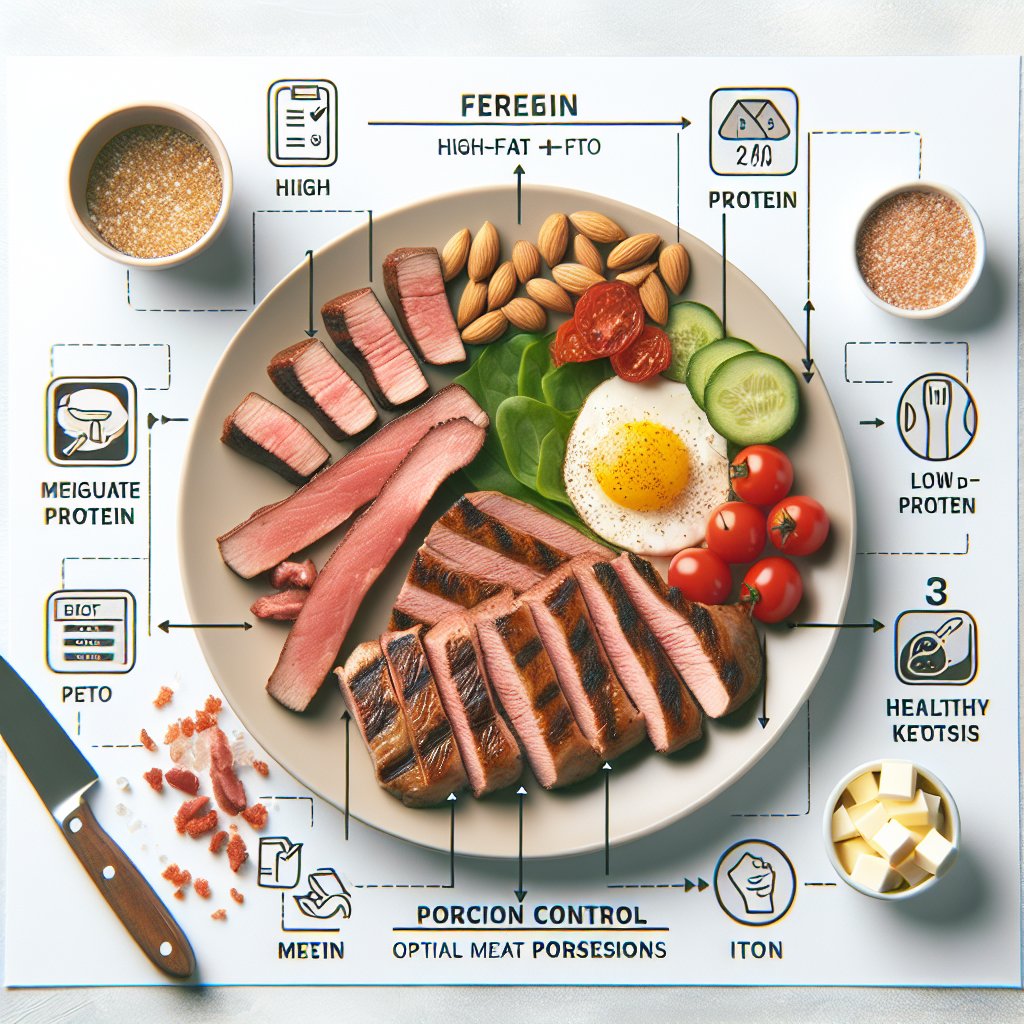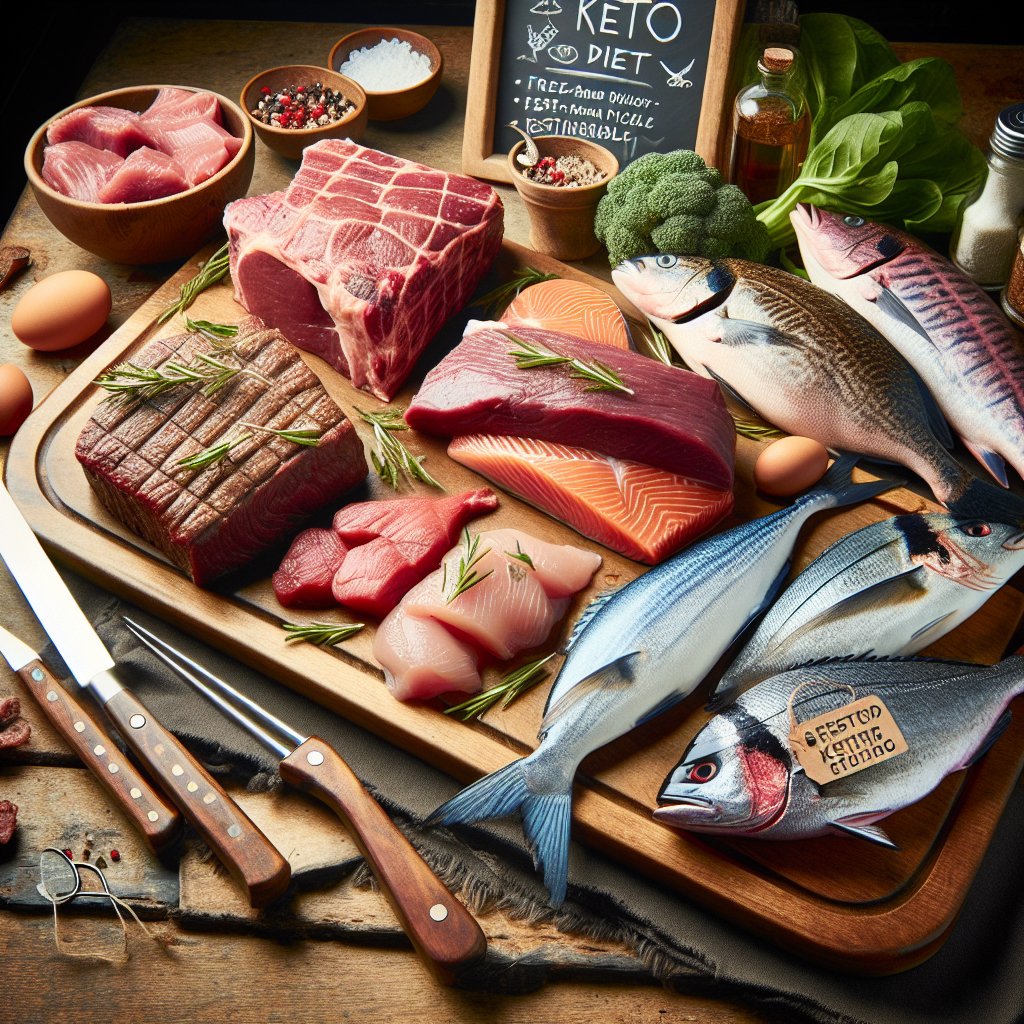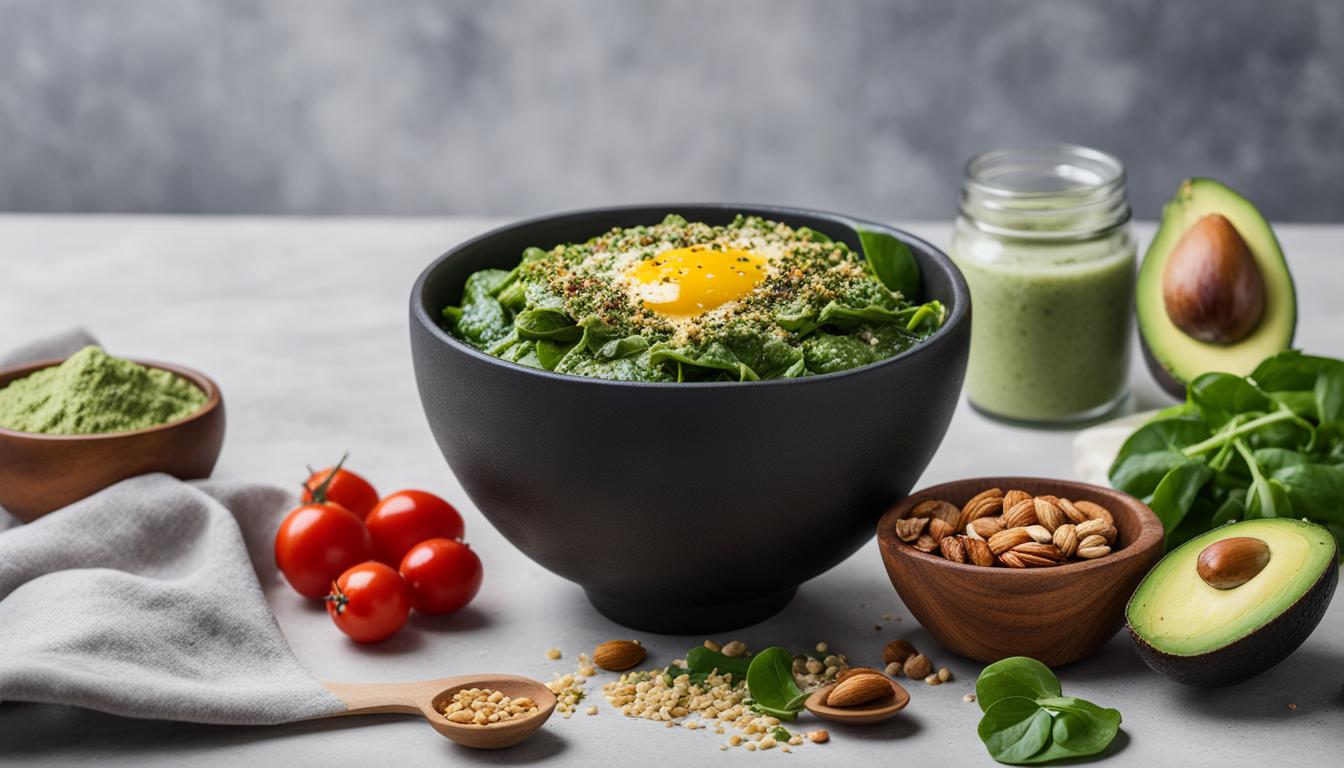How Much Meat Can I Eat on Keto? Exploring the Best Dietary Guidelines for Optimal Health
Understanding the Keto Diet: High-Fat, Moderate-Protein, and Low-Carb Intake
Welcome to our deep dive into the world of ketogenic diet – a lifestyle that has been gaining widespread attention for its promising health benefits. At its core, the keto diet emphasizes high-fat, moderate-protein, and low-carb intake. But what does this really mean? Let me break it down for you.
When you are on a keto diet, the focus is on drastically reducing your carbohydrate intake and instead, increasing your consumption of healthy fats. This metabolic state of drastically reducing carbs and replacing them with healthy fats shifts your body into a state of ketosis, where it becomes incredibly efficient at burning fat for energy.
Moreover, moderate protein intake is encouraged in order to support muscle maintenance and growth, and to avoid excessive gluconeogenesis which could potentially kick you out of ketosis. This essentially means that your body might convert excess protein into glucose, hindering the process of ketosis.
So, why is the keto diet so popular? Well, scientific research has shown that a ketogenic diet can aid in weight loss, boost energy levels, improve mental clarity, and even help in managing various health conditions.
Now that you understand the fundamentals, let’s delve deeper into the specifics of the keto diet and explore how it can be optimized to include meat in a healthy and sustainable manner.

Benefits of Meat on Keto Diet
When it comes to the ketogenic diet, meat plays a crucial role in providing essential nutrients that support overall health. Not only is meat a delicious and satisfying part of the diet, but it also offers a wide array of benefits that contribute to the success of the keto lifestyle.
Protein Powerhouse
Meat is a powerhouse of high-quality protein, which is essential for building and repairing tissues, including muscles. This macronutrient is also vital for preserving lean body mass during weight loss, making it an invaluable component of the keto diet. Research published in the American Journal of Clinical Nutrition has highlighted the importance of adequate protein intake for maintaining muscle mass and promoting satiety, both of which are crucial for weight management.
B Vitamin Bonanza
Those following a ketogenic diet can benefit from the abundance of B vitamins found in meat, such as B12, B6, riboflavin, and niacin. These vitamins play a vital role in energy production, brain function, and the formation of red blood cells. In fact, a study in the Journal of the American College of Nutrition emphasized the significance of B vitamins, particularly B12 and folate, in supporting overall health and well-being.
Iron-Rich Option
Iron is another essential nutrient that can be readily obtained from meat, with heme iron (found in animal products) being particularly well-absorbed by the body. Maintaining adequate iron levels is critical for delivering oxygen to cells and supporting overall energy levels. Research in the British Journal of Nutrition underscored the importance of heme iron in preventing iron deficiency and anemia, especially in populations such as women of reproductive age.
Therefore, meat serves as an invaluable source of these essential nutrients for individuals following the ketogenic diet. By incorporating a variety of meat options into your meals, you can ensure that your body receives the crucial protein, B vitamins, and iron required for optimal health.
Types of Meat Allowed on Keto
When it comes to the ketogenic diet, meat is a key player in providing the protein and healthy fats that your body needs to thrive. There are various types of meat that are not only suitable for consumption on the keto diet but are also incredibly delicious and versatile.
1. Grass-Fed Beef
Grass-fed beef is a fantastic choice for keto enthusiasts. Research shows that grass-fed beef contains higher levels of omega-3 fatty acids and conjugated linoleic acid (CLA) compared to grain-fed beef. These healthy fats can contribute to cardiovascular health and overall well-being.
2. Poultry
Poultry, such as chicken and turkey, are excellent sources of protein and are low in carbohydrates, making them ideal for the keto diet. Additionally, turkey is rich in tryptophan, an amino acid that supports serotonin production, promoting a sense of well-being and relaxation.
3. Fatty Fish
Fatty fish like salmon, mackerel, and sardines are not only delicious but also rich in heart-healthy omega-3 fatty acids. Studies have shown that omega-3s can aid in reducing inflammation and lowering the risk of chronic diseases, making fatty fish a valuable addition to your keto meal plan.
4. Pork
Pork is a versatile meat choice that can be enjoyed in various cuts and cooking styles. It provides a good mix of protein and healthy fats, and it’s important to choose high-quality, unprocessed pork products to reap the most benefits on the keto diet.
5. Lamb
Lamb is a flavorful meat that adds variety to your keto menu. It contains essential nutrients such as zinc and vitamin B12, which play vital roles in immune function and energy metabolism. Including lamb in your diet can offer a tasty and nutritious option for keto-friendly meals.
6. Organ Meats
While less commonly consumed in some Western diets, organ meats like liver, kidneys, and heart are powerhouse foods packed with essential nutrients. They are rich in micronutrients such as vitamin A, iron, and B vitamins, which are crucial for supporting overall health and vitality on a ketogenic eating plan.
These types of meat not only align with the macronutrient profile of the keto diet but also provide essential vitamins, minerals, and fatty acids that contribute to overall well-being.
It’s important to prioritize high-quality, ethically sourced meats to ensure that you are receiving the maximum nutritional benefits from your protein choices on the keto diet.
Optimal Meat Portions on Keto
One of the defining characteristics of the ketogenic diet is its focus on high protein and low-carbohydrate foods. Meat is a staple of the keto diet, as it provides essential nutrients and helps maintain ketosis, a state where the body burns fat for fuel instead of carbohydrates. When it comes to the recommended amount of meat to eat on the keto diet, it’s essential to strike a balance to support ketosis and overall health.
Research has shown that consuming moderate amounts of meat on the keto diet can be beneficial for overall health. A study published in the American Journal of Clinical Nutrition found that a moderate protein intake supports muscle mass, immune function, and overall physical performance, all of which are important for maintaining a healthy lifestyle on the keto diet.
Recommended Meat Portions
So, how much meat can you eat on the keto diet while still maintaining ketosis and overall health? Here are some guidelines to consider:
1. Protein Intake
For most individuals following the keto diet, it’s recommended to consume between 0.6 to 1 gram of protein per pound of body weight. This range can ensure that your body gets an adequate amount of protein to support muscle maintenance and growth without going overboard on protein, which could potentially kick you out of ketosis.
2. Balanced Meats
When choosing meats for your keto diet, focus on a variety of options such as chicken, turkey, beef, pork, and fish. This approach ensures that you’re getting a diverse array of nutrients and fatty acids. Additionally, incorporating organ meats like liver can provide essential micronutrients that support overall health on the keto diet.
3. Portion Control
Remember, portion control is key. A serving size of meat is typically around 3-4 ounces, which is about the size of a deck of cards. This allows you to enjoy the benefits of meat while still being mindful of your overall caloric and macronutrient intake.
By following these guidelines, you can ensure that you’re consuming an optimal amount of meat to support ketosis and overall health while enjoying the delicious, satisfying meals that the keto diet has to offer.

Impact of Excessive Meat Consumption on Keto
While the ketogenic diet is often associated with high meat consumption, it’s essential to strike a balance in your dietary choices. Consuming too much meat on the keto diet can potentially lead to drawbacks that may affect your ketosis and overall health.
Effects on Ketosis
Excessive consumption of meat on the keto diet might lead to an overabundance of protein, which can potentially affect ketosis. According to a study published in the American Journal of Clinical Nutrition, high-protein diets could lead to gluconeogenesis, a process in which the body converts excess protein into glucose, potentially disrupting ketosis. This means that consuming too much meat could hinder your body’s ability to stay in a state of ketosis.
Impact on Overall Health
Research suggests that a high intake of red and processed meats may have adverse effects on overall health. A study conducted by the Harvard T.H. Chan School of Public Health found that a high intake of red meat, especially when processed, is associated with an increased risk of heart disease and certain types of cancer. Additionally, the excessive consumption of certain types of meat, such as processed meats, has been linked to a higher risk of metabolic disorders and inflammatory diseases.
Moreover, a diet excessively high in meat and low in other food groups like vegetables and fruits can lead to micronutrient deficiencies. According to the Journal of the Academy of Nutrition and Dietetics, such diets may result in inadequate intake of essential vitamins and minerals, potentially impacting overall health and well-being.
It’s important to note that not all meats are created equal. Choosing lean or grass-fed meats and incorporating a variety of protein sources can mitigate some of these potential drawbacks. Additionally, balancing meat consumption with a diverse array of non-starchy vegetables, healthy fats, and moderate amounts of low-glycemic fruits can help to offset some of the negative effects associated with excessive meat consumption on the keto diet.
Ultimately, moderation and variety are key. Being mindful of the quantity and type of meat consumed, and integrating a diverse range of nutrient-dense foods, can help optimize the benefits of the keto diet while maintaining overall health.
Suggesting Ways to Incorporate a Variety of Meats into the Keto Diet for Balanced Nutrition
When following a ketogenic diet, incorporating a variety of meats into your meals is essential for balanced nutrition. It not only provides essential nutrients but also adds excitement and flavor to your diet. Here are some delicious and practical ways to include a wide range of meats in your keto meal plan:
1. Diversify Your Protein Sources
Instead of sticking to only one or two types of meat, such as chicken and beef, venture into a world of diverse protein sources. Incorporate options like poultry, beef, pork, lamb, and even game meats like bison or venison. Each type of meat offers different nutrients, textures, and flavors, providing a well-rounded nutritional profile for your body.
2. Experiment with Different Cuts and Preparations
Varying the cuts and preparations of meat can make your keto diet more interesting and nutritionally balanced. For example, try lean cuts like tenderloin or sirloin for beef, and skinless chicken breasts for poultry. Additionally, experiment with grilling, roasting, broiling, or stewing to create diverse flavor profiles and textures.
3. Include Fatty Fish and Seafood
While not technically “meat,” fatty fish and seafood such as salmon, mackerel, sardines, shrimp, and shellfish are excellent sources of protein and healthy fats for a ketogenic diet. Including these options can help diversify your protein intake and provide essential omega-3 fatty acids.
4. Mix in Organ Meats
Organ meats like liver, heart, and kidneys are incredibly nutritious and often more affordable than traditional cuts of meat. They are rich in vitamins, minerals, and antioxidants, making them a valuable addition to your keto meal plan. Look for creative recipes that incorporate these nutrient-dense options for a well-rounded approach to meat consumption.
5. Try Alternative Protein Sources
Do not limit yourself to only animal-based meats. Incorporating alternative protein sources like tofu, tempeh, or seitan can add variety to your diet and provide different textures and flavors. Just be mindful of the carb content in these options and consume them in moderation within your daily carb limit.
By diversifying your meat choices and experimenting with various preparations, you can create a balanced and exciting keto meal plan that provides essential nutrients while keeping your taste buds satisfied.
Ethical Considerations and Sustainability of Meat Consumption
When we talk about the ketogenic diet, it’s essential to consider the ethical and environmental aspects of consuming meat. The choices we make not only impact our health but also the world around us.
Many people choose to follow a keto diet that includes meat, and it’s crucial to make sustainable and ethical choices when incorporating meat into our meals. Research published in ScienceDirect revealed that sustainable dietary patterns, which include mindful meat consumption, can have positive impacts on both human health and the environment.
Ethical Considerations
Understanding the ethical considerations surrounding meat consumption allows us to make informed choices. It’s important to acknowledge the treatment of animals in the meat production industry. Choosing meat that comes from ethically raised and grass-fed animals can align with personal values of animal welfare. Look for labels such as “grass-fed,” “pasture-raised,” and “humanely raised” when purchasing meat to ensure that ethical standards are being met.
Environmental Impact
The environmental impact of meat production is a significant concern. Research published in the Nature Sustainability journal found that reducing meat consumption, particularly from ruminant animals, can lead to lower greenhouse gas emissions, reduced land use, and lower water consumption. This highlights the importance of making sustainable choices when it comes to meat intake on the keto diet.
Practical Tips for Making Sustainable Choices
Here are some practical tips for making sustainable choices when consuming meat on the keto diet:
1. Quality Over Quantity
Focus on the quality of meat over the quantity. Choosing grass-fed and pasture-raised meat may have a higher price tag, but it supports sustainable farming practices and animal welfare.
2. Diversify Your Protein Sources
Explore a variety of protein sources such as fish, poultry, and plant-based proteins like tofu and tempeh. Diversifying your protein intake reduces the environmental impact of meat production and provides a wider range of nutrients.
3. Support Local and Sustainable Farms
Seek out local farmers and suppliers who prioritize sustainable and ethical farming practices. This not only supports the local economy but also promotes environmentally friendly farming methods.
By being mindful of the ethical and environmental aspects of meat consumption and making sustainable choices, we can enjoy the benefits of the keto diet while contributing to a healthier planet for future generations.

Consulting with a Healthcare Provider or Nutritionist
When it comes to determining the optimal meat intake on the keto diet, consulting with a healthcare provider or nutritionist is crucial, especially for individuals with specific health conditions. While the ketogenic diet can have numerous benefits, it’s essential to ensure that your dietary choices align with your overall health needs.
Research has shown that consulting with a healthcare provider or a qualified nutritionist can provide personalized guidance based on individual health factors. For example, individuals with existing health conditions such as kidney disease or heart issues may require specific adjustments to their protein intake, which can be obtained through expert consultation.
Moreover, a study published in The American Journal of Clinical Nutrition emphasized the importance of individualized nutrition, indicating that personalized dietary recommendations can lead to better health outcomes.
The Role of a Healthcare Provider or Nutritionist
A healthcare provider or nutritionist can offer valuable insights into the appropriate amount of meat consumption based on your unique health circumstances. They can assess factors such as your current health status, any preexisting conditions, and your overall macronutrient needs.
For instance, individuals with insulin resistance could benefit from a higher fat and moderate protein approach, while someone with specific nutrient deficiencies may require a different balance of meat and other food sources.
By consulting with a professional, you can also gain clarity on portion sizes, types of meat, and potential supplementation to ensure a well-rounded and sustainable ketogenic diet.
Overall, consulting with a healthcare provider or nutritionist ensures that your meat intake aligns with your health goals, maximizes the benefits of the keto diet, and minimizes any potential risks associated with excessive or inadequate consumption of meat.
Remember, your health is unique, and seeking personalized guidance will help you navigate the keto diet in a way that supports your overall well-being.
Conclusion
As we explored the connection between meat consumption and the ketogenic diet, we discovered the significant benefits of moderate and balanced intake. It’s essential to remember that while meat can be a valuable part of a ketogenic lifestyle, moderation and balance are key. Our exploration found that an excessive consumption of certain meats can lead to potential health risks, while a reliance on processed meats may increase the likelihood of heart disease and other health issues.
Research indicates that a moderate intake of unprocessed meats, such as lean cuts of beef, poultry, and fatty fish, can provide valuable nutrients, including protein, healthy fats, and essential vitamins. However, it’s crucial to emphasize that embracing a diverse range of food sources is equally important in maintaining overall health and well-being.
When considering how much meat one can eat on the keto diet, focus on incorporating a variety of nutrient-dense food options. This approach ensures that you are not only benefiting from the nutrients in different meats but also receiving the unique nutrients found in vegetables, fruits, nuts, and seeds. Remember, balance and variety are fundamental pillars of a ketogenic lifestyle that supports optimal health and success.
This exploration has underscored the significance of mindfulness and informed decision-making when it comes to meat consumption on the keto diet. With a mindful approach to choosing and preparing meats, individuals can derive the benefits of the ketogenic diet while minimizing potential risks. Furthermore, by prioritizing high-quality, unprocessed meats and incorporating a diverse array of nutrient-rich foods, individuals can create a sustainable and healthful ketogenic eating pattern.
In conclusion, the ketogenic diet offers a pathway to improved health and well-being, and meat can certainly play a valuable role within this dietary framework. By embracing moderation, balance, and mindful choices, individuals can savor the benefits of a keto-friendly approach to meat consumption while supporting their overall health and vitality.


